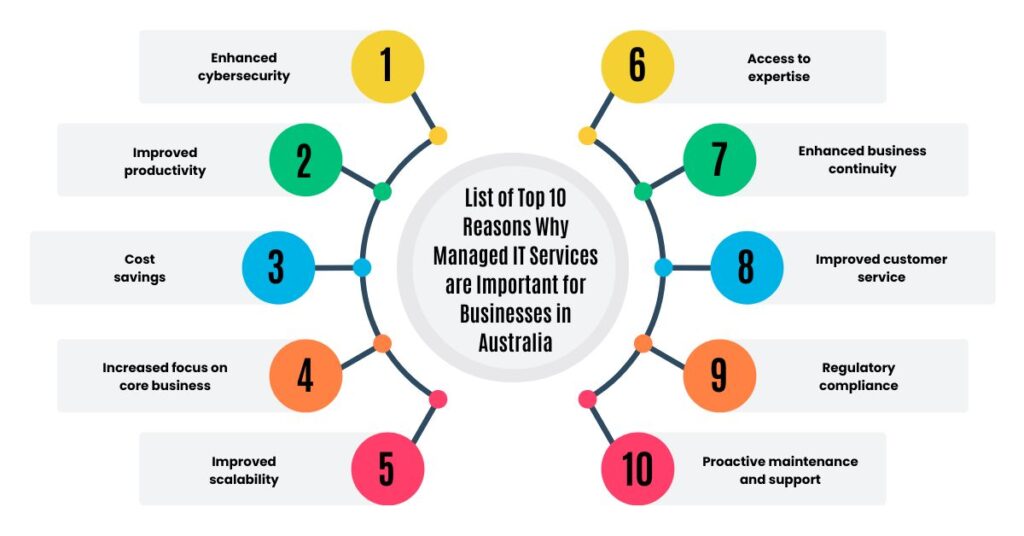The Australian business landscape is rapidly changing through digitalization. Cybersecurity, data protection, and building a robust and scalable IT infrastructure are huge demands on business’s internal IT teams.
In this scenario, managed IT services providers offer a comprehensive package of solutions that can enhance operational efficiency, boost productivity, and fuel growth.
List of Top 10 Reasons Why Managed IT Services are Important for Businesses in Australia

Here are a few reasons why managed IT services are important for business in Australia:
1. Enhanced cybersecurity
The threat of cyber in today’s digital age keeps changing and poses a high risk to all sizes of businesses. It is either the sophisticated ransomware attacks or data breaches, which compromise sensitive customer information. This makes the potential damage immense.
Cybersecurity is done through a multi-layered approach by managed IT service providers, using strong security measures like firewalls, intrusion detection systems, and advanced threat monitoring. This approach proactively helps businesses find and prevent potential threats from developing into full-blown events, securing their valuable data and protecting their reputation.
In addition, managed service providers are on top of current best practices in cybersecurity and emerging threats; therefore, businesses can rely on having the most recent defense mechanisms available to fight new cyberattacks.
2. Improved productivity
Managed IT services enhance the productivity of business operations because they streamline IT operations, thereby reducing downtime. It means that when the IT systems are at their best, employees do not have to be bothered with technical issues that divert their attention from core tasks.
Managed service providers monitor and maintain IT infrastructure proactively, ensuring that systems run smoothly and efficiently. This proactive approach reduces downtime caused by hardware failure, software glitches, and other technical problems, enabling employees to work productively and meet deadlines.
Moreover, with ready-to-use technical support, managed service providers enable employees to solve issues promptly and effectively, thus minimizing downtime and maximizing productivity.
3. Cost savings
The most important advantage that would result from managed IT services is their ability to save significantly higher costs. Maintaining a company’s in-house IT staff is expensive, which might involve considerable costs for salaries and benefits, training, as well as ongoing professional development.
By outsourcing the IT responsibilities of companies to a managed service provider, most of these costs will disappear, thus greatly reducing the cost of overall IT. In addition, managed service providers often provide predictable monthly fees that allow businesses to budget well for IT expenses, and avoid the cost surprise that comes with upgrading equipment, software licenses, or repairing emergencies.
Optimized IT infrastructure and improved efficiency will be used by managed IT services to reduce the cost of operations and, thereby improve the bottom line.
4. Increased focus on core business
Businesses free up internal resources for core competency focus by outsourcing the managed service provider with the burdens of managing day-to-day IT operations. Instead of devoting time and other resources to IT issues resolution, equipment maintenance, and security system protection, employees could be concentrating on driving innovation, market share expansion, and achievement of strategic business goals.
This can lead to considerable gains in productivity, competitiveness, and overall business success by being focused on core business activities. With a trusted managed service provider, businesses have the opportunity to achieve an edge over competitors by focusing on their internal strengths and what they do best while letting IT management complexities fall into expert hands.
5. Improved scalability
Adaptability in the changing market environment is critical in today’s dynamic business environment. Managed IT services offer the flexibility and scalability that businesses need to support growth and adapt to evolving IT needs. When a business is growing rapidly, it might have to scale its IT infrastructure to keep pace with the increased demand.
Managed service providers can quickly and easily scale up or down, ensuring businesses always have enough IT capacity for their trajectory of growth. This makes them better positioned to take advantage of new opportunities quickly, seize new opportunities when they arise, and compete in the rapidly changing marketplace.
6. Access to expertise
Access to a pool of experienced and highly skilled IT professionals would be granted to a company through partnering with a managed service provider. This access would cover areas like data analytics, cloud computing, and cybersecurity.
They can provide much-needed expertise regarding best practices, new emerging technologies, and strategic planning on how to best manage the company’s complex IT environment. This access to expertise can be invaluable for businesses, allowing them to make informed decisions about their investments in IT, optimize their IT infrastructure, and be ahead of the curve in a fast-changing technological landscape.
7. Enhanced business continuity
Natural catastrophes, power shutdowns, and cyber attacks might bring the business to a grinding halt. Therefore, with these unexpected happenings, there is always a need to have an IT service management provider to ensure business continuity through a robust disaster recovery plan and business continuity strategy.
The off-site data storage, measures related to data backup and recovery, and business continuity sites will allow businesses to immediately recover from disruptions and decrease the impact on operations. Through investment in a well-built business continuity plan, businesses can ensure their core operations are protected, their revenues safeguarded, and keep competition at bay.
8. Improved customer service
With increasing focus on the customer-centric market, providing great customer service is of utmost importance in today’s business environment. Well-planned and efficient IT infrastructure serves as a key support element in excellent customer service. Contributing directly to better customer services is managed IT services through ensured availability of communication channels, secure customer data, and smooth business operations.
When it is easy to reach the businesses, obtain quick service, and resolve queries effectively, then customers are bound to be satisfied and loyal. Moreover, using technology to better facilitate customer interactions, through online chatbots and self-service portals, managed IT services help improve the overall customer experience.
9. Regulatory compliance
In Australia, it is covered by various kinds of data protection and security regulations, the Privacy Act, and the Cybersecurity Legislation Amendment Bill 2021. One should strictly adhere to these data protection and security regulations to escape major fines and reputational loss.
A managed IT service provider can assist the business, therefore, in ensuring complete compliance with all data protection and security regulations such as the implementation of sufficient security measures, regular auditing, and advisory on better data protection practices. By partnering with a reputable managed service provider, businesses can minimize the risk of non-compliance and ensure that their operations are aligned with relevant Australian regulations.
10. Proactive maintenance and support
Proactive maintenance and support are essential to ensure that the IT systems are working optimally and are reliable. A managed IT service provider is proactive in IT management; they perform regular system checks, perform preventative maintenance, and identify and solve problems before they cause significant disruptions. This way, downtime is reduced, and the risk of unexpected system failure is reduced, thereby making sure that business operations run smoothly and efficiently.
The benefits of ongoing support and maintenance for an IT infrastructure by partnering with a managed service provider can help ensure the health, security, and optimal configuration of an IT infrastructure to meet business needs.
Summary
Here is the summary of the blog titled “Top 10 Reasons Why Managed IT Services are Important for Businesses in Australia“
- Enhanced cybersecurity
- Improved productivity
- Cost savings
- Increased focus on core business
- Improved scalability
- Access to expertise
- Enhanced business continuity
- Improved customer service
- Regulatory compliance
- Proactive maintenance and support
Conclusion
As far as modern Australian businesses are concerned, this changing and increasingly digitalized business environment calls for a vital investment in managed IT services.
Through the skills and competencies of a renowned managed service provider, it would enhance the cybersecurity position, raise productivity, make processes smooth and efficient, and thereby make the business stand at the top.
This strategic approach enables businesses to navigate the complex digital world, focus on core competencies, and enjoy sustainable growth in the competitive Australian market. With managed IT services, Australian businesses can achieve their full potential, survive in the digital age, and attain long-term success.
FAQs
Q. What are the major benefits of selecting ByteWay as my managed IT services provider?
Ans. ByteWay differentiates itself by having IT support that is proactive about the prevention and resolution of issues before they can negatively affect business operations. The company focuses on powerful cybersecurity solutions to protect businesses against advanced cyber threats with superior threat detection and prevention systems. Finally, ByteWay focuses on solutions customized for every client and relationship, which has fostered a strong trust relationship with its clients based on long-term support.
How do managed IT services improve my business productivity?
Ans. Managed IT services will significantly improve business productivity since they streamline IT operations and also mitigate common IT challenges. This means less downtime since business operations are not hampered by IT issues. In addition, employees get the right tools and support for effective work, thus enhancing productivity.
Furthermore, managed IT services allow better communication and collaboration among teams hence improving workflow. Finally, it protects critical business data from cyber threats and ensures business continuity with minimum disruption.
Q. What is the average price of managed IT services in Australia?
Ans. The price of managed IT services in Australia ranges widely, based on various factors. First and foremost, business size is crucial, since large businesses typically require more comprehensive services.
The actual services needed are also essential to determining pricing because comprehensive packages naturally cost more than basic support. Lastly, the service provider chosen also determines pricing as different providers have different service levels and prices. Most of the providers offer flexible pricing models that include a monthly subscription or pay-as-you-go options, which help fit the business needs and budget.
What would be the best way I can choose the right managed IT services provider for my business?
Ans. The selection of an appropriately managed IT services provider is done by taking account of several important factors. Primarily, experience and expertise take precedence; you want an experienced provider with a portfolio of proven success and personnel comprised of highly skilled professionals.
Also, you want to ascertain that the provider is giving specific services your business uniquely requires, matching their services precisely to your needs. Thirdly, assess the provider’s quality of customer service and response, such that it focuses on clients’ satisfaction and timely assistance. Finally, evaluate the price structure and terms of the contract to ascertain their transparency, fairness, and relevance to your budget and business needs.
In what way do managed IT services aid a business in its anticipation of growth?
Ans. Effective scalability to adapt to the dynamic requirement of growth is delivered through the flexibility offered by managed IT services. The availability of scalable solutions such as cloud computing can easily adapt businesses’ scaling of their IT resources on the go and thereby fit their dynamic requirements for doing business.
Also, analytics and business intelligence tools-the use of which are also offered in many of the managed services enable the management team to derive valuable information into performance so that a well-targeted strategy to mitigate certain flaws may be drafted for execution.
Last, managed IT service companies enable the companies to adopt the growing emerging technologies like AI or IoT for future business leadership.




